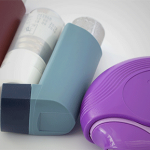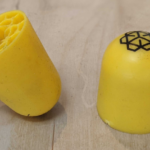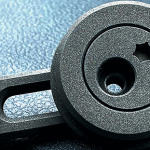- Home
- Projection Micro Stereolithography
- Introducing Projection Micro Stereolithography
Introducing Projection Micro Stereolithography
Introducing Projection Micro Stereolithography
You may not have come across the term before, or you might know a little about it already, but in this article we are introducing Projection Micro Stereolithography (PµSL) 3D printing. PµSL is an exciting additive manufacturing technology for building parts that cannot be produced using other technologies such as conventional SLA, DLP, SLS or PolyJet.
What is PµSL?
PµSL builds parts, layer by layer, by curing a liquid photopolymer resin with ultraviolet light. As such, it is related to SLA (stereolithography) and DLP (digital light projection), yet there are important differences that set it apart.
In common with DLP, PµSL cures an area of resin with a single flash, rather than using a point of laser light as in SLA. However, the optics used in PµSL enable far higher resolution to be achieved than with DLP. The technology is therefore ideal for building small parts with fine detail and tight tolerances.
Whereas DLP builds larger parts by using optics to extend the spread of the projected light, this comes at the expense of resolution. In contrast, PµSL builds larger parts by moving the bed in the XY plane, so larger layers are cured with multiple projections of light.
Benefits of PµSL
Thanks to the technology’s resolution (down to 2µm) and a general tolerance on parts of ±10µm ~ ±25µm, PµSL achieves very fine details, thin walls and sharp edges. In addition, PµSL parts benefit from near-isotropic material properties.
The technology’s high resolution and small layer thickness (5-40µm) mean parts have an excellent surface finish. This is typically 0.4-0.8µm Ra on the top and 1.5-2.5µm Ra on the sides. Consequently, sanding and other hand finishing processes are seldom necessary.
Furthermore, because the parts are usually small and they are surrounded by liquid resin that imparts buoyancy, support structures are seldom necessary.
As the layer thickness is smaller than for DLP, and the bed could potentially be moved multiple times per layer, you might expect the build time to be longer. However, parts tend to be smaller than would be the case for DLP 3D printing, so the build time remains relatively short.
Materials and finishes
As you might expect for an additive manufacturing technology using photosensitive resins, there is a choice of materials. Three examples are:
- HTL resin – this High Temp Low-viscosity, high-performance engineering material, has high strength and rigidity. Finished parts also have excellent heat resistance, so they can withstand temperatures up to 114°C.
- BIO resin – a biocompatible resin suitable for non-implantable medical applications. This material can be sterilised and has passed numerous ISO 10993 biocompatibility tests.
- RG resin – a durable engineering material suitable for functional testing and end-use parts. It does not absorb moisture and is biocompatible.
After printing, PµSL parts are washed, UV hardened and have support structures and witness marks removed. After that, the choice of finishes is, theoretically, similar to those available for parts produced using SLA or DLP, including build line removal, lacquering, painting, application of a rubberised ‘soft feel’ coating to external surfaces, and a blackout/EMI/RFI coating can be applied inside. In addition, assembly operations can be performed, such as installing threaded inserts.
However, PµSL parts tend to be smaller than those produced using SLA or DLP and have a better surface finish due to the higher resolution. In almost every case, therefore, parts are supplied without any further finishing.
Typical applications
PµSL is well suited to the production of concept models, functional prototype parts and low-volume end-use parts, particularly where sizes are small. Typical applications include medical and drug delivery devices, plus life sciences, biotechnology and microfluidics components.
Of course, designers are extremely creative people, so PµSL is also used for a wide variety of other applications – anywhere, in fact, where a project can benefit from PµSL’s ability to 3D print small, high-quality parts.
Conclusion
As we have seen, PµSL has some similarities to conventional SLA and DLP. In reality, the smaller build envelope and higher resolution mean PµSL is not a competitor or alternative to these two technologies. Rather, it 3D print parts that could not be produced using SLA or DLP – or, indeed, any of the other commonly used 3D printing technology.
Talk to us
If you would like to know more about the exciting possibilities offered by PµSL, talk to us on 01763 249760.





